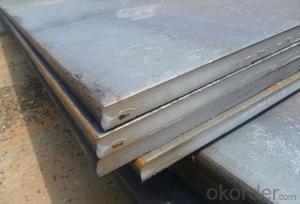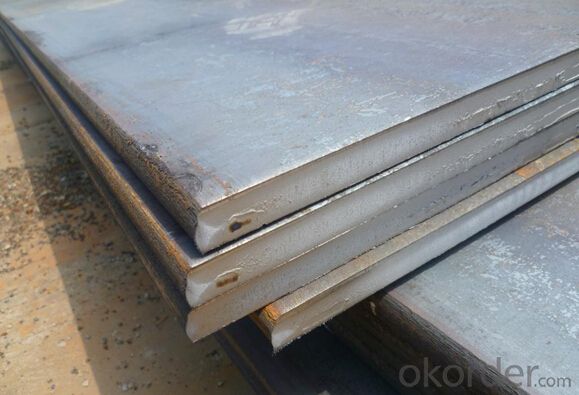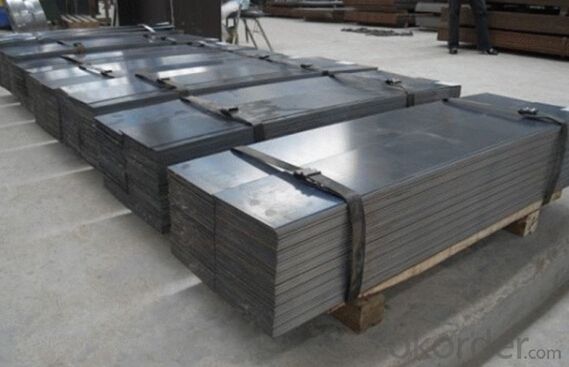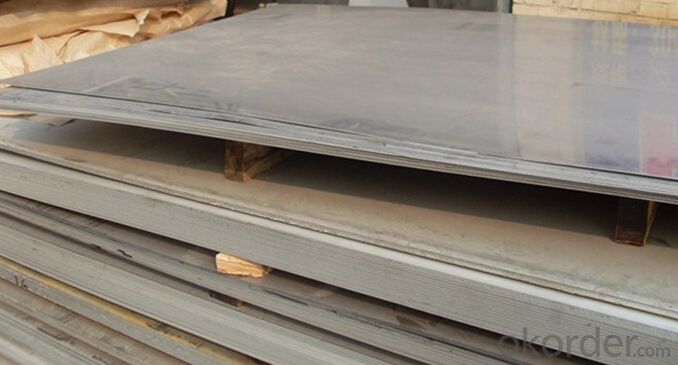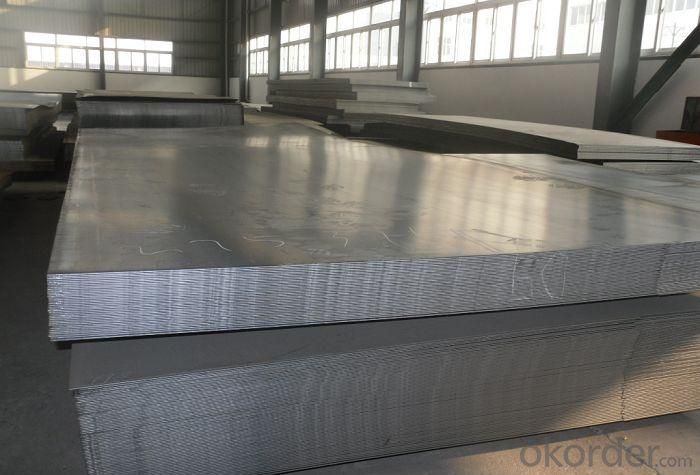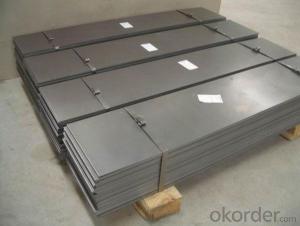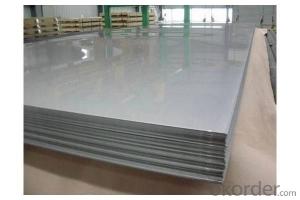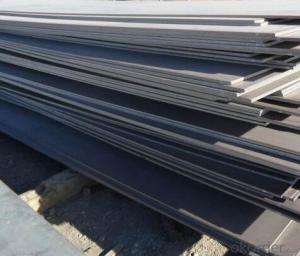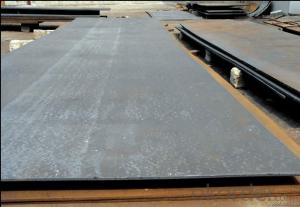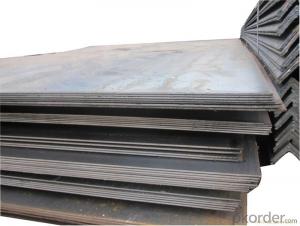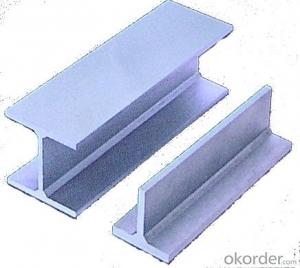ASTM A36 Hot Rolled Mild Steel Plate Sheet
- Loading Port:
- Tianjin
- Payment Terms:
- TT OR LC
- Min Order Qty:
- 3 m.t.
- Supply Capability:
- 100000 m.t./month
OKorder Service Pledge
OKorder Financial Service
You Might Also Like
Specification
ASTM A36 Hot Rolled Mild Steel Plate Sheet
Detailed Information of ASTM A36 Hot Rolled Mild Steel Plate Sheet
| C | Si | P | S | yield Strength MAp | Tensile strength MAp | Elongation % | ||
| A36 | 0.24 | 0.4 | 0.045 | 0.03 | 250 | 400-520 | 26 | |
| C | Si | Mn | P | S | Cu | |||
| A283 | ≤0.27 | 0.15-0.4 | ≤0.9 | ≤0.035 | ≤0.04 | ≥0.2 | ||
| Thickness: | 6mm, 8mm, 12mm, 16mm, 20mm, 25mm, 30mm, 50mm, 80mm, 100mm, 150mm, 200mm | |||||||
| Width: | 1500mm, 1800mm, 2000mm, 2200mm, 2500mm | |||||||
| Length: | 6000mm, 8000m, can cut to width and length | |||||||
| Packing Details; | according to customer‘s require or export’s standard | |||||||
| Delivery time; | 7 days for stock sizes, 20-25 days for new production sizes | |||||||
| Port: | Tianjin China | |||||||
Related Products Overviews of ASTM A36 Hot Rolled Mild Steel Plate Sheet
Product Name | Typical Grades | Diameter(mm) | Standard Adopted |
Carbon Steel | 20 (1020/S20C/C22) |
Ø16-Ø300 |
GB/SAE/ JIS/DIN |
40 (1040/S40C/C40) | |||
45 (1045/S45C/C45) | |||
Bearing Steel | GCr9 (51100/SUJ1) |
Ø12-Ø250 | |
GCr15 (52100/SUJ2/100Gr6) | |||
GCr9SiMn (A485-Gr.1/SUJ3) | |||
Cr-Mo Steel | 20Cr (5120/SCr420H/20Cr4) |
Ø12-Ø250 | |
40Cr (5140/SCr440/41Cr4) | |||
42CrMo(4140/SCM440/42CrMo4) | |||
Gear Steel | 20CrNiMo |
Ø16-Ø600 | |
20CrMn(5115/SMnC420/20MnCr5) | |||
20CrNiMo(8620/SNCM220/20CrMiMo2) |
Related Products Application of ASTM A36 Hot Rolled Mild Steel Plate Sheet
Carbon Steel | l Mold bottom l Plastic mold l Construction machinery parts l Automobile parts l Security grills l Screens l Construction |
Bearing Steel | l Aerospace l Navigation l Nuclear energy l Chemical industry l Electronic information l Petrochemical l Instrument and meter l Transportation |
Cr-Mo Steel | l Mechanism & Fasteners gear l Stressed components for vehicles l Engines and machines l Parts of larger cross-section |
Gear Steel | l All kinds of gears l Statically and dynamically stressed component for vehicles l Engines and machine l Larger cross-section parts l Crankshafts |
Company Introduction of ASTM A36 Hot Rolled Mild Steel Plate Sheet
CNBM International Corporation is the most import and export platform of CNBM group(China National Building Material Group Corporation) ,which is a state-owned enterprise, ranked in 270th of Fortune Global 500 in 2015.
With its advantages, CNBM International are mainly concentrate on Cement, Glass, Iron and Steel, Ceramics industries and devotes herself for supplying high quality series of refractories as well as technical consultancies and logistics solution.
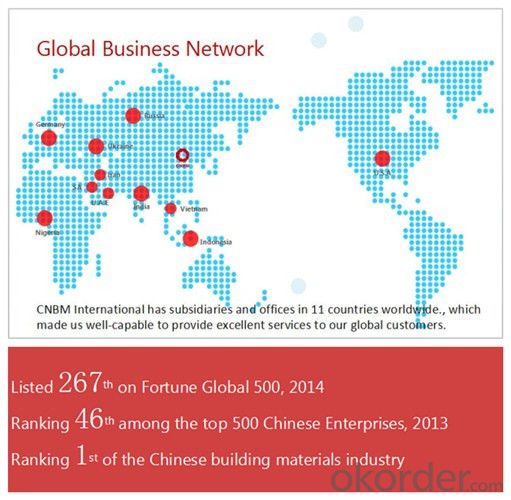
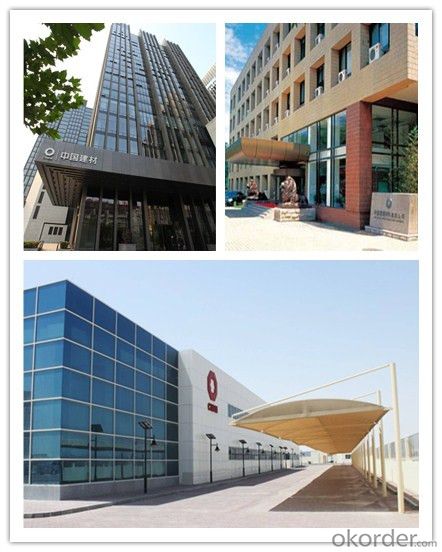
After-sale service | l CNBM provides the services and support you need for every step of our cooperation. We’re the business partners you can trust; you can relax and get on with doing business. l For any problem, please kindly contact us at any your convenient time, we’ll reply you in our first priority within 24 hours
|
Advantages
| l Industry experience over 20 years. l Shipment of goods -More than 70 countries worldwide. l The most convenient transport and prompt delivery. l Competitive price with best service. l High technical production line with top quality products. l High reputation based on best quality products.
|
Packaging & Delivery of ASTM A36 Hot Rolled Mild Steel Plate Sheet
Packaging Detail | Sea worthy packing /as per customer's packing instruction |
Delivery Detail | 15 ~ 40 days after receiving the deposit |
Products Show
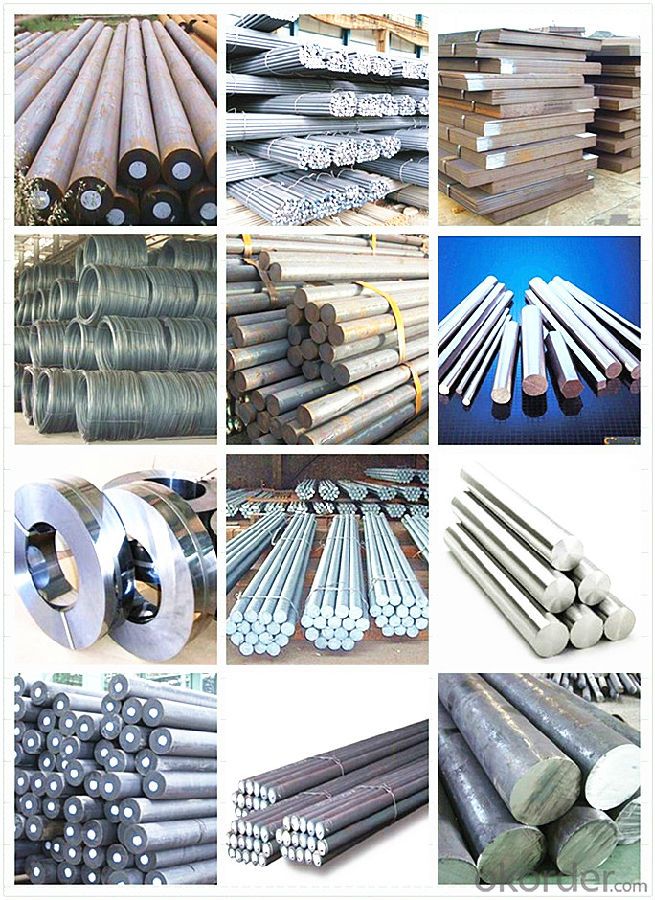
FAQ:
Are you a trading company or manufacturer? | Manufacturer |
What’s the MOQ? | 3 metric ton |
What’s your delivery time? | 15-35 days after downpayment received |
Do you Accept OEM service? | Yes |
what’s your delivery terms? | FOB/CFR/CIF |
What's the Payment Terms? | 30% as deposit,70% before shipment by T/T |
Western Union acceptable for small amount. | |
L/C acceptable for large amount. | |
Scrow ,Paybal,Alipay are also ok | |
Why choose us? | Chose happens because of quality, then price, We can give you both. Additionally, we can also offer professional products inquiry, products knowledge train (for agents), smooth goods delivery, excellent customer solution proposals. |
What's your available port of Shipment? | Main Port, China |
What’s your featured services? | Our service formula: good quality+ good price+ good service=customer's trust
|
Where are your Market? | Covering more than 160 countries in the world |
- Q: How does special steel perform in high-pressure environments?
- Special steel performs exceptionally well in high-pressure environments due to its high tensile strength, excellent corrosion resistance, and ability to withstand extreme temperatures. Its superior mechanical properties make it highly suitable for applications such as oil and gas pipelines, pressure vessels, and offshore drilling equipment, where it can effectively handle the intense pressures and maintain structural integrity even under harsh conditions.
- Q: How does special steel perform in oil and gas applications?
- Special steel performs exceptionally well in oil and gas applications due to its excellent corrosion resistance, high strength, and temperature resistance. It is specifically designed to withstand harsh environments, including exposure to corrosive chemicals, high pressure, and extreme temperatures. This makes it an ideal material for manufacturing pipelines, valves, drill bits, and other critical components used in the oil and gas industry. Additionally, special steel's superior mechanical properties ensure durability, reliability, and longevity, thereby reducing maintenance costs and improving overall operational efficiency.
- Q: What are the advantages of using special steel in the marine sector?
- Special steel has several advantages when used in the marine sector. Firstly, special steel is highly resistant to corrosion, which is crucial in a marine environment where constant exposure to saltwater can cause regular steel to rust and deteriorate. This corrosion resistance extends the lifespan of structures and components, reducing maintenance costs and increasing safety. Secondly, special steel offers excellent strength and toughness, making it suitable for the demanding conditions of the marine sector. It can withstand high stress, impact, and vibration, ensuring the integrity of the structures even in rough seas or extreme weather conditions. Moreover, special steel can be fabricated into various shapes and sizes, allowing for customization and optimization of marine components. This versatility enables the production of lightweight yet robust structures, improving fuel efficiency, and reducing the overall weight of the vessel. Additionally, special steel can withstand low temperatures, making it suitable for marine applications in colder climates or polar regions. It retains its mechanical properties even in sub-zero temperatures, ensuring the safety and reliability of marine operations. In summary, the advantages of using special steel in the marine sector include corrosion resistance, high strength and toughness, versatility in fabrication, and low-temperature resistance. These qualities enhance the durability, safety, and efficiency of marine structures and components.
- Q: What are the different methods of testing the mechanical properties of special steel?
- There are several methods used to test the mechanical properties of special steel. These methods aim to determine the strength, hardness, ductility, and other characteristics of the steel. Some common methods include: 1. Tensile Testing: This is the most common method used to determine the tensile strength of steel. A sample is subjected to a gradually increasing tensile force until it breaks. The force and elongation measurements are used to calculate properties such as ultimate tensile strength, yield strength, and elongation. 2. Hardness Testing: This method measures the resistance of steel to indentation or scratching. Common hardness tests include Rockwell, Brinell, and Vickers hardness tests. These tests provide information about the steel's ability to withstand deformation, wear, or penetration. 3. Impact Testing: This method evaluates the steel's ability to absorb energy during sudden impact or shock loading. The Charpy and Izod tests are commonly used to measure the impact toughness of steel. These tests involve striking a notched sample with a pendulum and measuring the energy absorbed during fracture. 4. Bend Testing: This method is used to assess the ductility and flexibility of steel. A sample is bent to a specific angle or radius until it fractures. The bend test helps determine the steel's ability to endure bending or forming processes without failure. 5. Fatigue Testing: This method evaluates the steel's resistance to repeated cyclic loading. Fatigue tests involve subjecting a sample to varying levels of stress for a specified number of cycles until failure. This helps determine the steel's endurance limit and fatigue strength. 6. Microhardness Testing: This technique measures the hardness of small localized areas on the steel's surface. It is useful for evaluating surface treatments, case hardening, and assessing the effects of heat treatment. 7. Non-Destructive Testing (NDT): These methods allow testing without damaging the steel. Common NDT techniques include ultrasonic testing, magnetic particle testing, eddy current testing, and radiographic testing. NDT methods are used to detect internal defects, cracks, or discontinuities that may affect the steel's mechanical properties. These various testing methods provide valuable information about the mechanical properties of special steel, assisting in quality control, material selection, and ensuring the steel meets the required standards and specifications.
- Q: What are the requirements for special steel used in industrial equipment manufacturing?
- The requirements for special steel used in industrial equipment manufacturing typically include high strength, durability, corrosion resistance, and the ability to withstand high temperatures and pressure. Additionally, the steel should have excellent machinability and weldability to facilitate the manufacturing process. These requirements ensure that the steel can withstand the demanding conditions and provide long-lasting performance in industrial equipment.
- Q: How does special steel resist fatigue?
- Special steel resists fatigue due to its unique composition and manufacturing process. It is typically made with higher levels of alloying elements such as chromium, molybdenum, and nickel, which enhance its strength and durability. Additionally, special steel undergoes specific heat treatments and rigorous quality control measures, ensuring its structural integrity and resistance to cyclic loading. These factors help prevent the formation and propagation of cracks and fractures, enabling the steel to withstand repeated stress and strain without significant degradation or failure.
- Q: What are the applications of special steel in the medical field?
- Special steel has various applications in the medical field due to its unique properties and characteristics. One of the primary applications of special steel in the medical field is in the manufacturing of surgical instruments. Special steel, such as stainless steel, is widely used to produce sharp, durable, and corrosion-resistant surgical instruments like scalpels, forceps, scissors, and surgical needles. These instruments need to be strong enough to withstand repeated use and sterilization without losing their sharpness or integrity, and special steel provides the necessary strength and durability. Another important application of special steel in the medical field is in the production of implants and prosthetics. Special steel alloys, including titanium alloys, cobalt-chromium alloys, and nickel-titanium alloys, are commonly used to manufacture orthopedic implants, dental implants, and various other medical devices. These alloys offer excellent biocompatibility, corrosion resistance, and mechanical strength, making them ideal for long-term implantation in the human body. Additionally, special steel is used in the construction of medical equipment and machinery. Diagnostic machines like MRI scanners and X-ray machines often utilize special steel components due to their magnetic properties and ability to withstand high temperatures. The use of special steel in medical equipment ensures the accuracy, reliability, and safety of these devices. Furthermore, special steel is employed in the manufacturing of medical storage and transportation systems. Steel cabinets, trolleys, and containers are commonly used to store and transport medical supplies, instruments, and samples. Special steel ensures the durability and hygiene of these storage systems, as it is easy to clean, resistant to contamination, and has a long lifespan. In conclusion, the applications of special steel in the medical field are extensive and diverse. From surgical instruments to implants, medical equipment to storage systems, special steel plays a vital role in ensuring the effectiveness, reliability, and safety of medical procedures and treatments. Its unique properties make it an indispensable material in the healthcare industry.
- Q: What are the different methods for case hardening special steel?
- There are several different methods for case hardening special steel, each with its own advantages and applications. 1. Carburizing: This method involves heating the steel in a carbon-rich environment at high temperatures. Carbon atoms diffuse into the surface of the steel, forming a hard and wear-resistant outer layer. Carburizing can be done through various techniques such as gas carburizing, pack carburizing, or liquid carburizing. 2. Nitriding: Nitriding is a process where the steel is heated in a nitrogen-rich environment. Nitrogen atoms diffuse into the surface of the steel, forming a hard and corrosion-resistant layer. This process is mainly used for steels with high alloy content. 3. Induction hardening: Induction hardening utilizes induction heating to selectively heat the surface of the steel. Once heated, a quenching process rapidly cools the surface, resulting in a hard layer. Induction hardening is ideal for parts that require localized hardening, such as gears or shafts. 4. Flame hardening: Flame hardening involves heating the surface of the steel with a high-temperature flame and then rapidly cooling it. This method is commonly used for large parts or components that cannot be easily treated with other methods. 5. Laser hardening: Laser hardening is a precise and localized method that uses a laser beam to heat and harden specific areas of the steel. This technique is highly controlled and allows for precise control over the hardened layer depth and hardness. Each method has its own advantages and limitations, and the choice of case hardening method depends on factors such as the desired hardness, the size and shape of the part, and the specific requirements of the application.
- Q: Can special steel be used in the packaging industry?
- Yes, special steel can be used in the packaging industry. Special steel, such as stainless steel, offers excellent durability, corrosion resistance, and strength, making it suitable for various packaging applications. It can be used to manufacture packaging containers, machinery, and equipment, providing a reliable and long-lasting solution for packaging needs.
- Q: What are the different aerospace grades of special steel?
- Some of the different aerospace grades of special steel include 15-5PH, 17-4PH, 300M, 4130, 4340, 440C, and H11. These grades are specifically designed to meet the high-performance requirements of the aerospace industry, providing excellent strength, corrosion resistance, and heat resistance properties.
Send your message to us
ASTM A36 Hot Rolled Mild Steel Plate Sheet
- Loading Port:
- Tianjin
- Payment Terms:
- TT OR LC
- Min Order Qty:
- 3 m.t.
- Supply Capability:
- 100000 m.t./month
OKorder Service Pledge
OKorder Financial Service
Similar products
Hot products
Hot Searches
Related keywords
